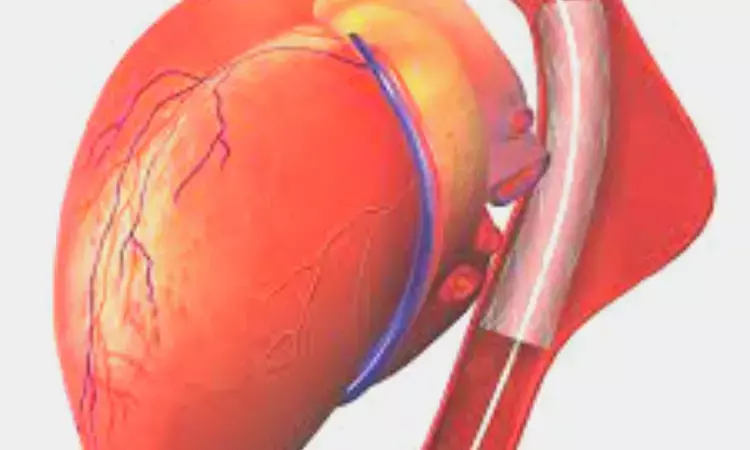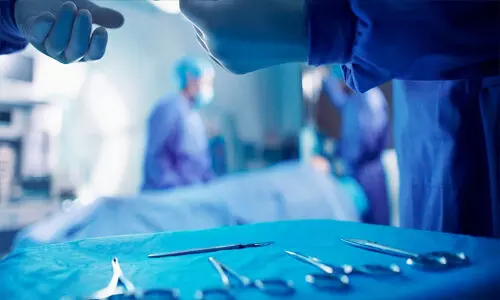- Home
- Medical news & Guidelines
- Anesthesiology
- Cardiology and CTVS
- Critical Care
- Dentistry
- Dermatology
- Diabetes and Endocrinology
- ENT
- Gastroenterology
- Medicine
- Nephrology
- Neurology
- Obstretics-Gynaecology
- Oncology
- Ophthalmology
- Orthopaedics
- Pediatrics-Neonatology
- Psychiatry
- Pulmonology
- Radiology
- Surgery
- Urology
- Laboratory Medicine
- Diet
- Nursing
- Paramedical
- Physiotherapy
- Health news
- Fact Check
- Bone Health Fact Check
- Brain Health Fact Check
- Cancer Related Fact Check
- Child Care Fact Check
- Dental and oral health fact check
- Diabetes and metabolic health fact check
- Diet and Nutrition Fact Check
- Eye and ENT Care Fact Check
- Fitness fact check
- Gut health fact check
- Heart health fact check
- Kidney health fact check
- Medical education fact check
- Men's health fact check
- Respiratory fact check
- Skin and hair care fact check
- Vaccine and Immunization fact check
- Women's health fact check
- AYUSH
- State News
- Andaman and Nicobar Islands
- Andhra Pradesh
- Arunachal Pradesh
- Assam
- Bihar
- Chandigarh
- Chattisgarh
- Dadra and Nagar Haveli
- Daman and Diu
- Delhi
- Goa
- Gujarat
- Haryana
- Himachal Pradesh
- Jammu & Kashmir
- Jharkhand
- Karnataka
- Kerala
- Ladakh
- Lakshadweep
- Madhya Pradesh
- Maharashtra
- Manipur
- Meghalaya
- Mizoram
- Nagaland
- Odisha
- Puducherry
- Punjab
- Rajasthan
- Sikkim
- Tamil Nadu
- Telangana
- Tripura
- Uttar Pradesh
- Uttrakhand
- West Bengal
- Medical Education
- Industry
Thoracic endovascular aortic repair may decrease mortality rate of TBAD versus medical treatment: Study

New research found that thoracic endovascular aortic repair (TEVAR) was productive and has reduced patients' in-hospital stay or 30-day mortality rate with Type B aortic dissections (TBADs) compared to the medical treatment group. The study results were published in the journal BMC Surgery. Better treatment results were seen in old-age patients, and those with uncomplicated TBADs with TEVAR than with medical treatment.
Endovascular therapy techniques have advanced significantly, offering a promising alternative to traditional medical treatment for patients with Type B aortic dissections (TBADs). Type B aortic dissections occur when the inner layer of the aorta tears, allowing blood to flow between layers of the aortic wall, which can lead to severe complications. The main treatment options include best medical therapy (BMT), aimed at managing blood pressure and other risk factors, and thoracic endovascular aortic repair (TEVAR), which involves inserting a stent to support the aorta and prevent further damage. As research showed that both techniques have been effective researchers conducted a meta-analysis to compare mortality rates and overall complications between TEVAR and BMT in patients with TBADs. The goal was to determine whether TEVAR provides better outcomes than BMT alone, particularly in terms of reducing early mortality and complications.
The analysis included randomized controlled trials and prospective or retrospective cohort studies comparing the effectiveness of TEVAR and BMT in treating Type B aortic dissection. Researchers searched multiple electronic databases to gather relevant studies for comparison. In total, 32 cohort studies involving 150,836 patients were included in the final analysis.
Findings:
- The results revealed that TEVAR was associated with a significantly lower 30-day mortality rate compared to BMT.
- The relative risk (RR) of 30-day mortality for patients undergoing TEVAR was 0.79, with a confidence interval (CI) of 0.63 to 0.99 and a P-value of 0.04. This reduction in mortality was particularly notable in patients aged 65 and older, where the relative risk was 0.78 (CI: 0.64–0.95, P = 0.01).
- However, patients who underwent TEVAR had significantly longer hospital stays compared to those who received BMT. The mean difference (MD) in hospital stay was 3.42 days (CI: 1.69–5.13, P = 0.0001), and the mean ICU stay was 3.18 days longer (CI: 1.48–4.89, P = 0.0003).
- On the other hand, BMT was associated with an increased risk of stroke, with an RR of 1.52 (CI: 1.29–1.79, P < 0.00001).
- In terms of long-term outcomes, no significant differences were found between TEVAR and BMT groups for late mortality rates at 1, 3, and 5 years.
- Similarly, there were no significant differences in the incidence of major complications such as acute renal failure, spinal cord ischemia, myocardial infarction, respiratory failure, or sepsis between the two groups.
Thus, the meta-analysis demonstrated that TEVAR is associated with a significantly lower mortality rate for patients with Type B aortic dissections compared to BMT, particularly in older patients aged 65 and above. Although TEVAR patients experience longer hospital and ICU stays, the procedure's benefits in reducing early mortality make it a viable alternative to medical therapy alone. Despite these promising findings, further randomized controlled trials are necessary to confirm the advantages of TEVAR over BMT and to explore potential long-term benefits or risks.
Further reading: Motawea, K.R., Rouzan, S.S., Elhalag, R.H. et al. Efficacy of thoracic endovascular aortic repair versus medical therapy for treatment of type B aortic dissection. BMC Surg 24, 259 (2024). https://doi.org/10.1186/s12893-024-02555-4
BDS, MDS
Dr.Niharika Harsha B (BDS,MDS) completed her BDS from Govt Dental College, Hyderabad and MDS from Dr.NTR University of health sciences(Now Kaloji Rao University). She has 4 years of private dental practice and worked for 2 years as Consultant Oral Radiologist at a Dental Imaging Centre in Hyderabad. She worked as Research Assistant and scientific writer in the development of Oral Anti cancer screening device with her seniors. She has a deep intriguing wish in writing highly engaging, captivating and informative medical content for a wider audience. She can be contacted at editorial@medicaldialogues.in.
Dr Kamal Kant Kohli-MBBS, DTCD- a chest specialist with more than 30 years of practice and a flair for writing clinical articles, Dr Kamal Kant Kohli joined Medical Dialogues as a Chief Editor of Medical News. Besides writing articles, as an editor, he proofreads and verifies all the medical content published on Medical Dialogues including those coming from journals, studies,medical conferences,guidelines etc. Email: drkohli@medicaldialogues.in. Contact no. 011-43720751




